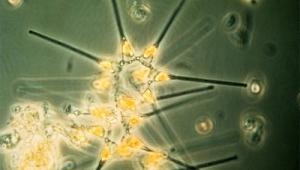Emerging threats: Plankton perilDepletion of ocean phytoplankton could suffocate life on planet Earth
About two-thirds of the planet’s total atmospheric oxygen is produced by ocean phytoplankton — and therefore cessation would result in the depletion of atmospheric oxygen on a global scale, which could threaten the mortality of animals and humans.

Oxygen-producing phytoplankton // Source: noaa.gov
Scientists reveal how Earth’s oxygen could dramatically fall due to change in ocean temperature of just several degrees.
Falling oxygen levels caused by global warming could be a greater threat to the survival of life on planet Earth than flooding, according to research led by Professor Sergei Petrovskii from the University of Leicester’s Department of Mathematics.
U Leicester reports that the study shows that an increase in the water temperature of the world’s oceans of around six degrees Celsius — which some scientists predict could occur as soon as 2100 — could stop oxygen production by phytoplankton by disrupting the process of photosynthesis.
About two-thirds of the planet’s total atmospheric oxygen is produced by ocean phytoplankton — and therefore cessation would result in the depletion of atmospheric oxygen on a global scale, which could threaten the mortality of animals and humans.
The team developed a new model of oxygen production in the ocean that takes into account basic interactions in the plankton community, such as oxygen production in photosynthesis, oxygen consumption because of plankton breathing, and zooplankton feeding on phytoplankton.
— Read more in Sergei Petrovskii, “Mathematical Modelling of Plankton-Oxygen Dynamics under the Climate Change,” Bulletin of Mathematical Biology (25 November 2015): 1-29
